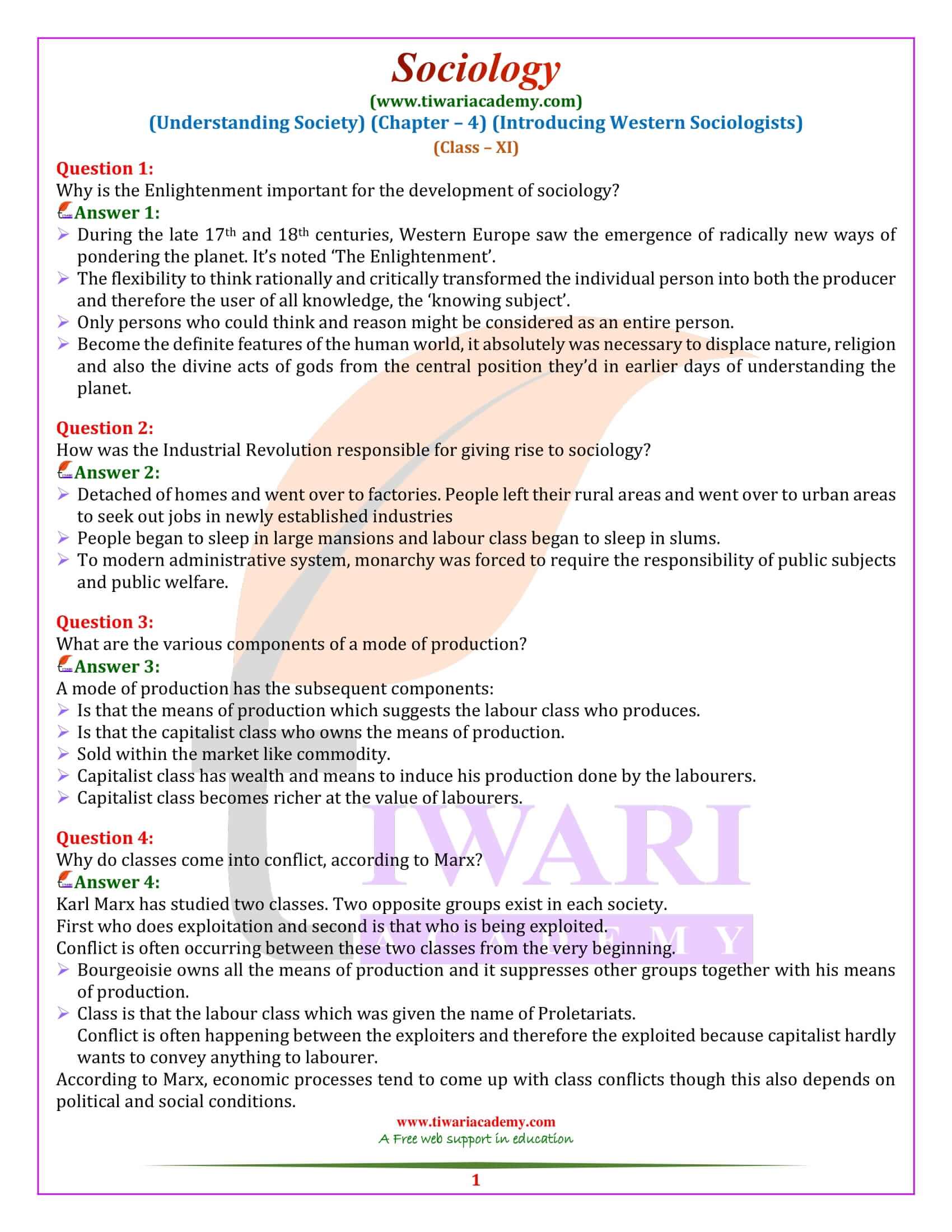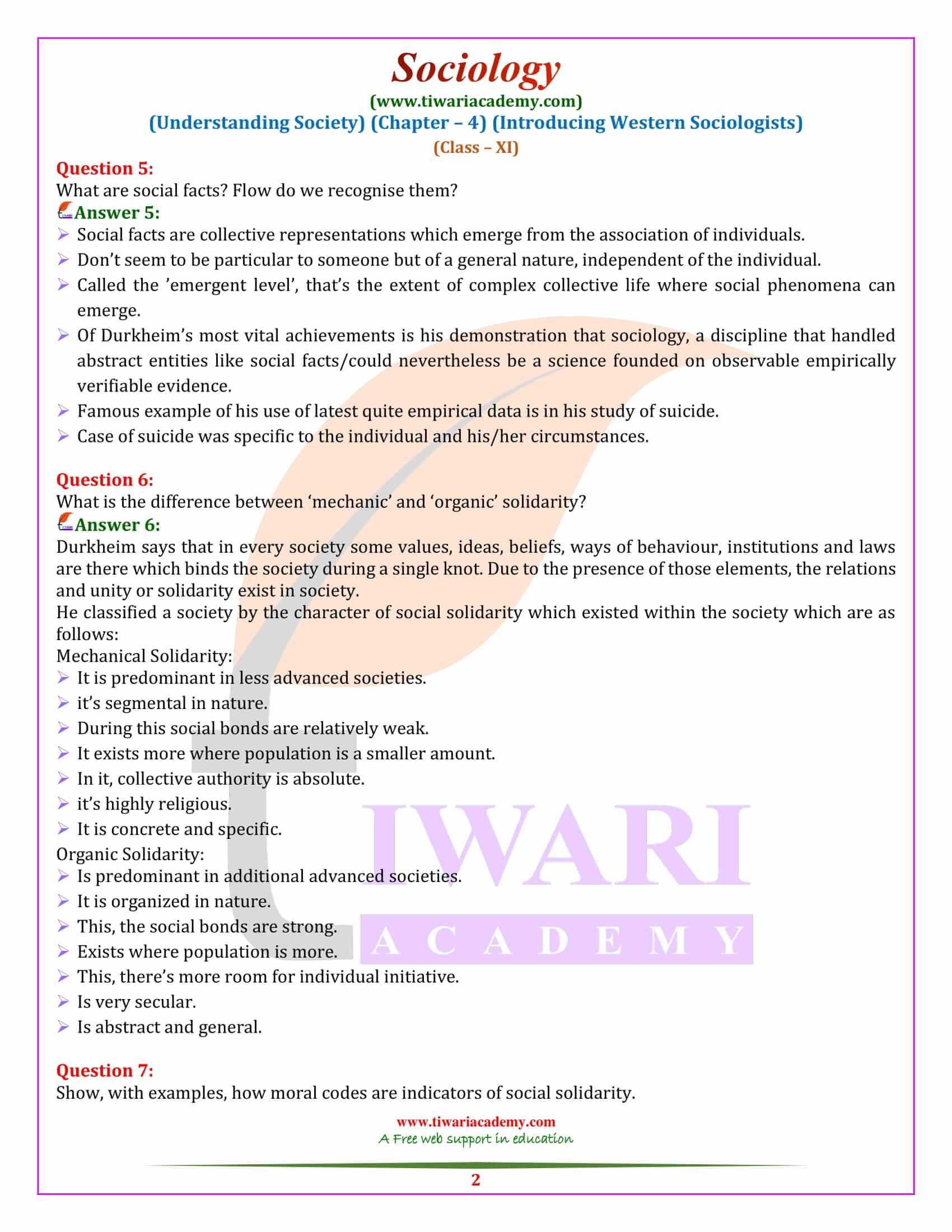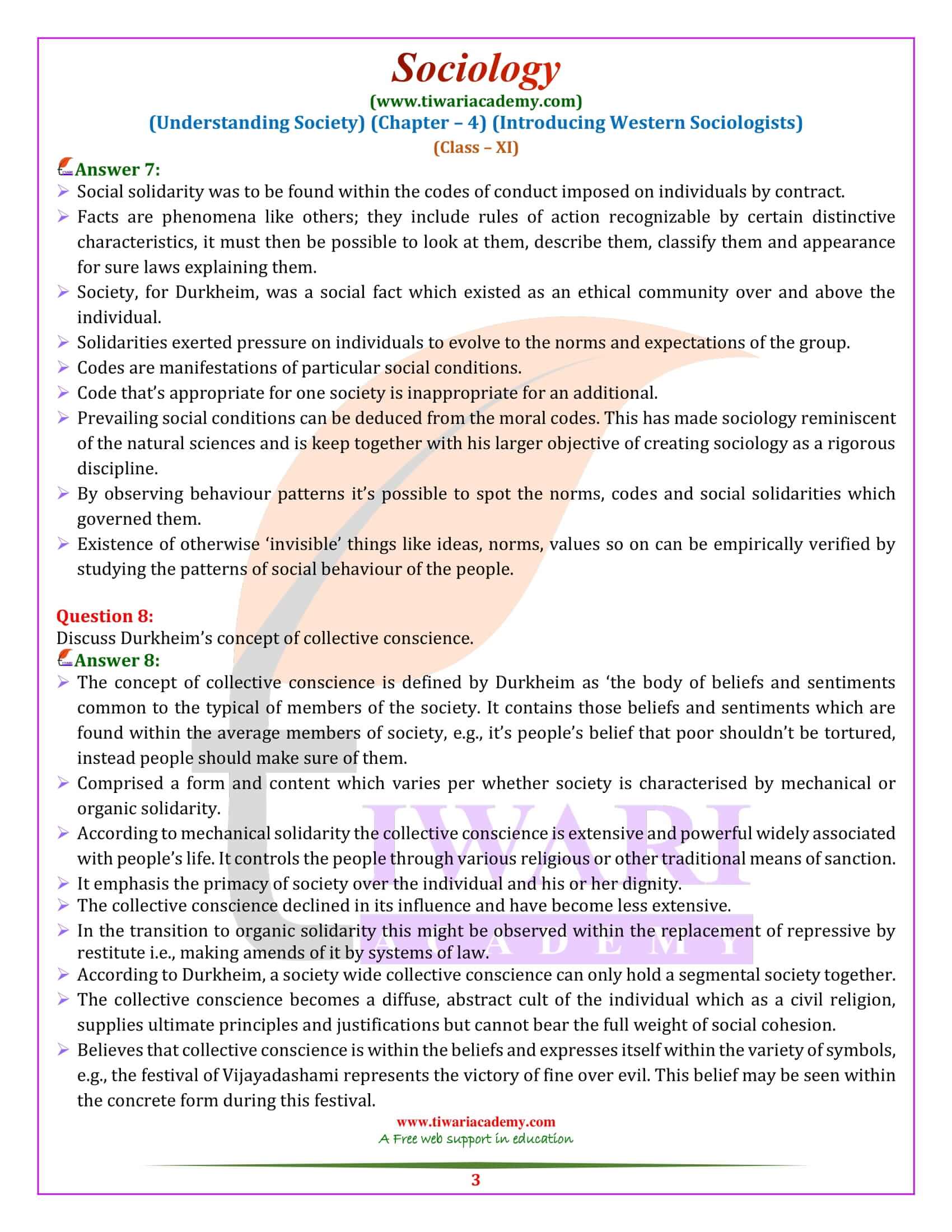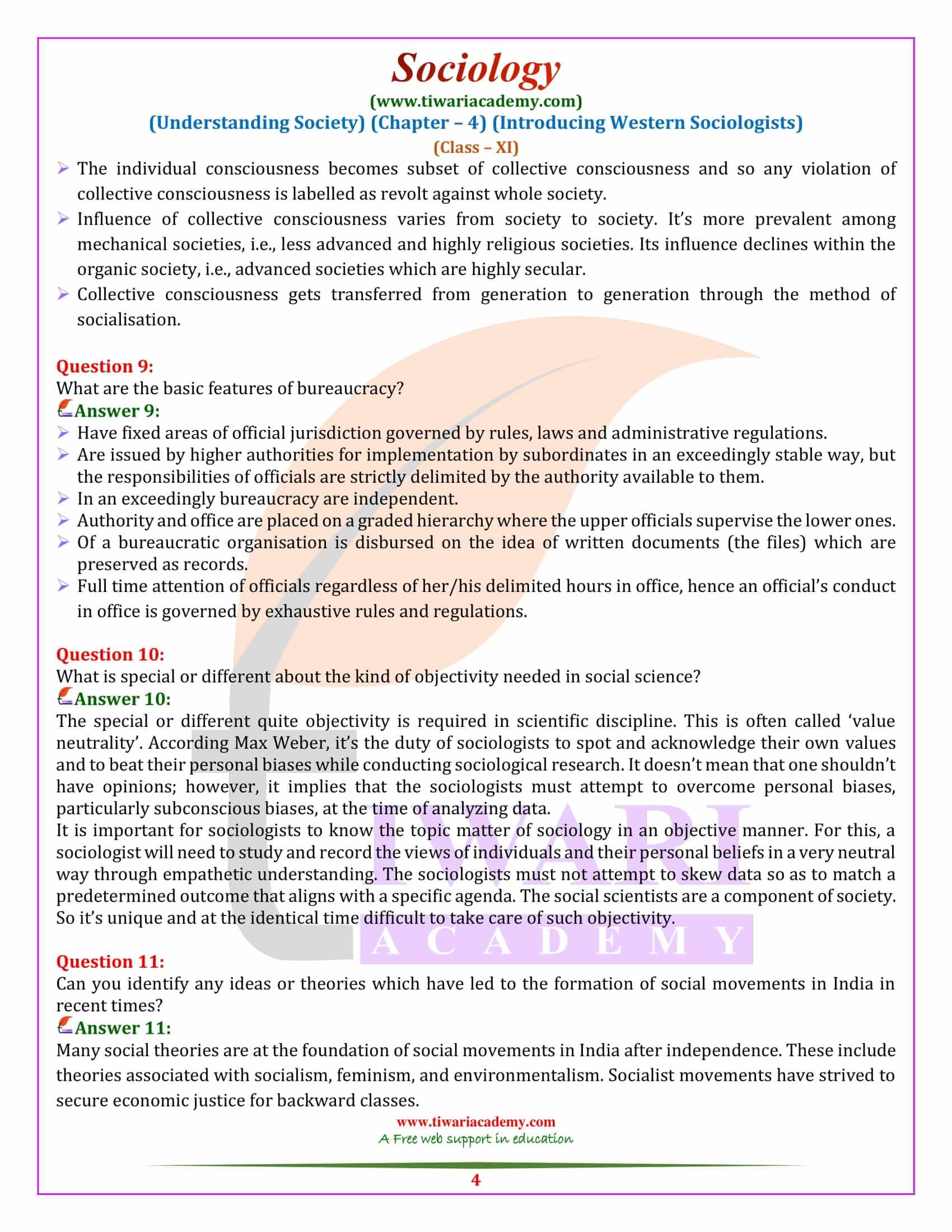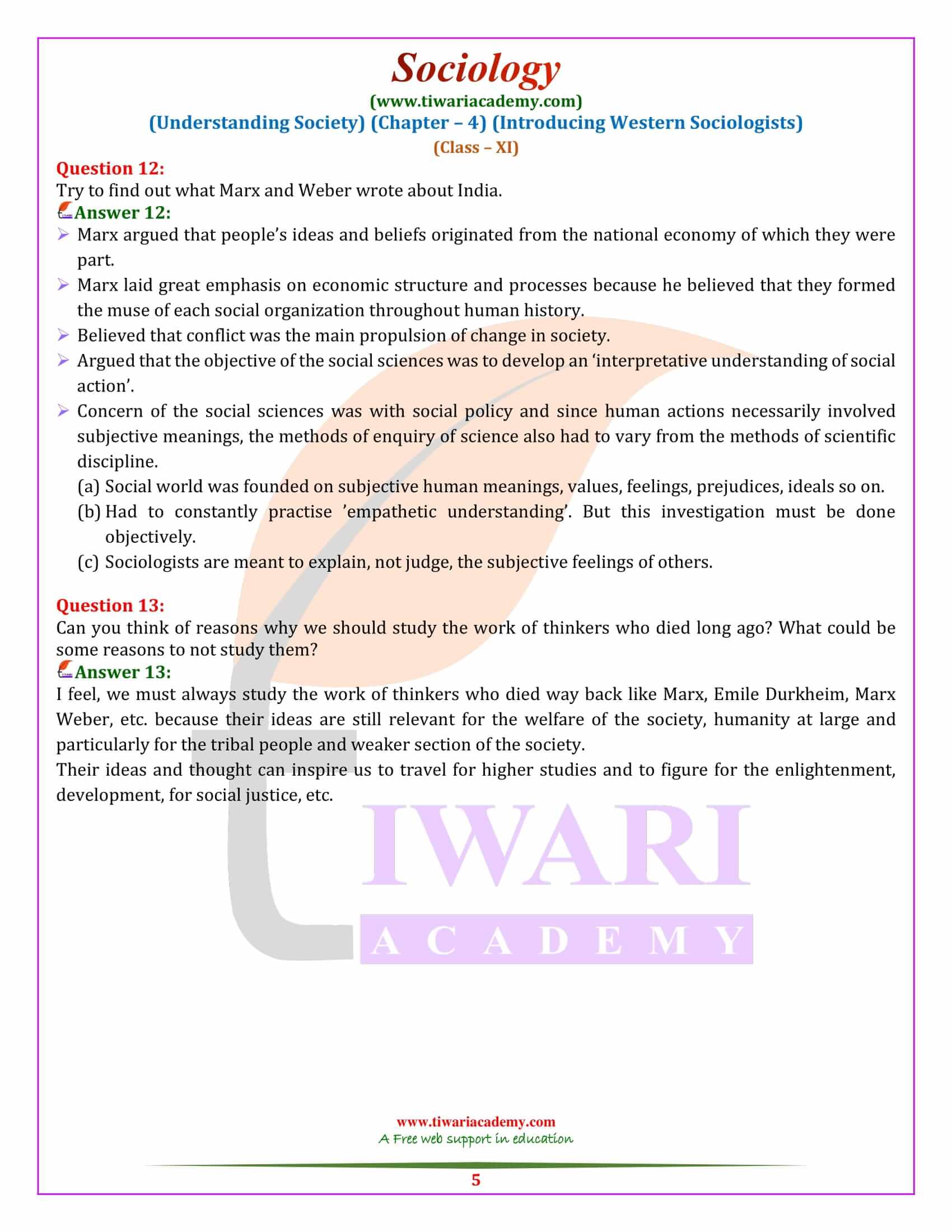NCERT Solutions for Class 11 Sociology Chapter 4 Introducing Western Sociologists exercises question answers for session 2025-26. Class 11 Sociology Part II Understanding Society chapter 4 multiple choice questions and extra question answers are helpful for CBSE as well as State board students.
Class 11 Sociology Chapter 4 Introducing Western Sociologists Question Answers
Why is the Enlightenment important for the development of sociology?
During the late 17th and 18th centuries, Western Europe saw the emergence of radically new ways of pondering the planet. It’s noted ‘The Enlightenment’.
The flexibility to think rationally and critically transformed the individual person into both the producer and therefore the user of all knowledge, the ‘knowing subject’.
Only persons who could think and reason might be considered as an entire person.
Become the definite features of the human world, it absolutely was necessary to displace nature, religion and also the divine acts of gods from the central position they’d in earlier days of understanding the planet.
How was the Industrial Revolution responsible for giving rise to sociology?
Detached of homes and went over to factories. People left their rural areas and went over to urban areas to seek out jobs in newly established industries
People began to sleep in large mansions and labour class began to sleep in slums.
To modern administrative system, monarchy was forced to require the responsibility of public subjects and public welfare.
What are the various components of a mode of production?
A mode of production has the subsequent components:
- Is that the means of production which suggests the labour class who produces.
- Is that the capitalist class who owns the means of production.
- Sold within the market like commodity.
- Capitalist class has wealth and means to induce his production done by the labourers.
- Capitalist class becomes richer at the value of labourers.
Why do classes come into conflict, according to Marx?
Karl Marx has studied two classes. Two opposite groups exist in each society.
First who does exploitation and second is that who is being exploited.
Conflict is often occurring between these two classes from the very beginning.
Bourgeoisie owns all the means of production and it suppresses other groups together with his means of production.
Class is that the labour class which was given the name of Proletariats.
Conflict is often happening between the exploiters and therefore the exploited because capitalist hardly wants to convey anything to labourer.
According to Marx, economic processes tend to come up with class conflicts though this also depends on political and social conditions.
Show, with examples, how moral codes are indicators of social solidarity.
Social solidarity was to be found within the codes of conduct imposed on individuals by contract.
Facts are phenomena like others; they include rules of action recognizable by certain distinctive characteristics, it must then be possible to look at them, describe them, classify them and appearance for sure laws explaining them.
Society, for Durkheim, was a social fact which existed as an ethical community over and above the individual.
Solidarities exerted pressure on individuals to evolve to the norms and expectations of the group.
Codes are manifestations of particular social conditions.
Code that’s appropriate for one society is inappropriate for an additional.
Prevailing social conditions can be deduced from the moral codes. This has made sociology reminiscent of the natural sciences and is keep together with his larger objective of creating sociology as a rigorous discipline.
By observing behaviour patterns it’s possible to spot the norms, codes and social solidarities which governed them.
Existence of otherwise ‘invisible’ things like ideas, norms, values so on can be empirically verified by studying the patterns of social behaviour of the people.
Discuss Durkheim’s concept of collective conscience.
The concept of collective conscience is defined by Durkheim as ‘the body of beliefs and sentiments common to the typical of members of the society. It contains those beliefs and sentiments which are found within the average members of society, e.g., it’s people’s belief that poor shouldn’t be tortured, instead people should make sure of them.
Comprised a form and content which varies per whether society is characterised by mechanical or organic solidarity.
According to mechanical solidarity the collective conscience is extensive and powerful widely associated with people’s life. It controls the people through various religious or other traditional means of sanction.
It emphasis the primacy of society over the individual and his or her dignity.
The collective conscience declined in its influence and have become less extensive.
In the transition to organic solidarity this might be observed within the replacement of repressive by restitute i.e., making amends of it by systems of law.
According to Durkheim, a society wide collective conscience can only hold a segmental society together.
The collective conscience becomes a diffuse, abstract cult of the individual which as a civil religion, supplies ultimate principles and justifications but cannot bear the full weight of social cohesion.
Believes that collective conscience is within the beliefs and expresses itself within the variety of symbols, e.g., the festival of Vijayadashami represents the victory of fine over evil. This belief may be seen within the concrete form during this festival.
The individual consciousness becomes subset of collective consciousness and so any violation of collective consciousness is labelled as revolt against whole society.
Influence of collective consciousness varies from society to society. It’s more prevalent among mechanical societies, i.e., less advanced and highly religious societies. Its influence declines within the organic society, i.e., advanced societies which are highly secular.
Collective consciousness gets transferred from generation to generation through the method of socialisation.
